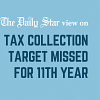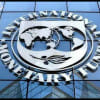Tax collection target likely to be missed, again

The National Board of Revenue (NBR) has been failing to achieve tax collection targets since the fiscal year of 2012-13 because of lofty goals set by the government and the absence of major reforms.
In the current fiscal year, the tax administration is likely to miss the collection target once again.
The NBR managed to collect Tk 204,008 crore in the nine months to March of the current fiscal year of 2021-22, which is 62 per cent of the collection goal of Tk 330,000 crore. This means tax officials will have to clock a staggering 63 per cent growth in the last quarter of FY22 to hit the target.
"It is unusual. It means that collection target is unlikely to achieve," said Selim Raihan, executive director of the South Asian Network on Economic Modelling.
Between July and March, the NBR's collection grew by 14.45 per cent driven by a 20.5 per cent jump in its receipts as customs tariffs thanks to surging prices of imported items.
Income tax collection rose 14 per cent but the collection of value-added tax, the biggest source of revenue for the government, was a laggard in terms of growth during the period.
Raihan said increased customs duty collection might not sustain as the central bank tightened rules to discourage imports of non-essential commodities. Towfiqul Islam Khan, senior research fellow of the Centre for Policy Dialogue, says the revenue growth achieved by the NBR in the FY22 has largely been driven by skyrocketing commodity prices.
"Regrettably, the growth attained in the area of indirect tax collection at the external level could not be maintained in the case of indirect tax at the domestic level and the income tax. Indeed, the growth of indirect tax collection at the domestic level was less than the nominal GDP growth expected by the Bangladesh Bureau of Statistics."
"This is simply unacceptable," he said.
Even if the attained growth rate in the nine months sustains, the NBR will face a shortfall to the tune of more than Tk 30,000 crore, Khan added.
The government has not revised downwards the target for the NBR, which generates roughly 86 per cent of the total revenue for the state.
A senior official of the NBR said the revenue collection usually gained pace in the last quarter of the fiscal year, especially in the month of June because of increased implementation of the Annual Development Programme, one of the major sources of withholding taxes from contractors.
He said the NBR's overall collection is likely to be Tk 310,000 crore at the end of the fiscal year.
That means this would be the 10th consecutive year the NBR would fail to achieve the original and revised targets fixed by the government, data from the finance ministry showed.
A very higher target than the actual collection, the absence of major reforms aimed at modernising the tax administration and governance-related problems have been the main factors for the recurrent failure to hit the revenue generation goals.
For instance, the government gave a 25 per cent higher target for the NBR in FY22 than the actual collection of Tk 263,872 crore in the last fiscal year.
In FY21 too, the NBR was tasked with logging a 53 per cent higher tax growth from Tk 216,037 crore earned a year ago.
On average, the annual tax collection target was 40 per cent higher for the revenue administration than it could actually collect in the last nine years, according to the NBR.
Raihan, also a professor of the economics department at the University of Dhaka, said the NBR has been failing to attain targets as there had been no structural changes in the tax systems.
"We have not seen any major improvement in tax infrastructure. There has been no major push for digitalisation. We have seen efforts for modernisation but those are not integrated. They are rather sporadic. Also, governance-related problems have not been addressed."
The professor said the higher tax target and collection is necessary to push up the tax-to-GDP ratio as Bangladesh aspires to become a developed economy.
Rashed Al Mahmud Titumir, a professor of economics at the Department of Development Studies of the University of Dhaka, said the NBR is likely to miss the target like the previous years.
"As usual, it will need to revise the collection target."
He said it was evident that there would be a squeeze in consumption for the economic slowdown caused by the coronavirus pandemic.
"Keeping in mind the possible shock, it was necessary for the tax authority to prepare strategies to increase collection. But we have not seen any strategy from the NBR to respond to the crisis," he said, adding that the strategy was necessary to create fiscal space for development spending.
Prof Titumir said the revenue authority could take steps to settle tax-related cases in courts.

 For all latest news, follow The Daily Star's Google News channel.
For all latest news, follow The Daily Star's Google News channel. 








Comments